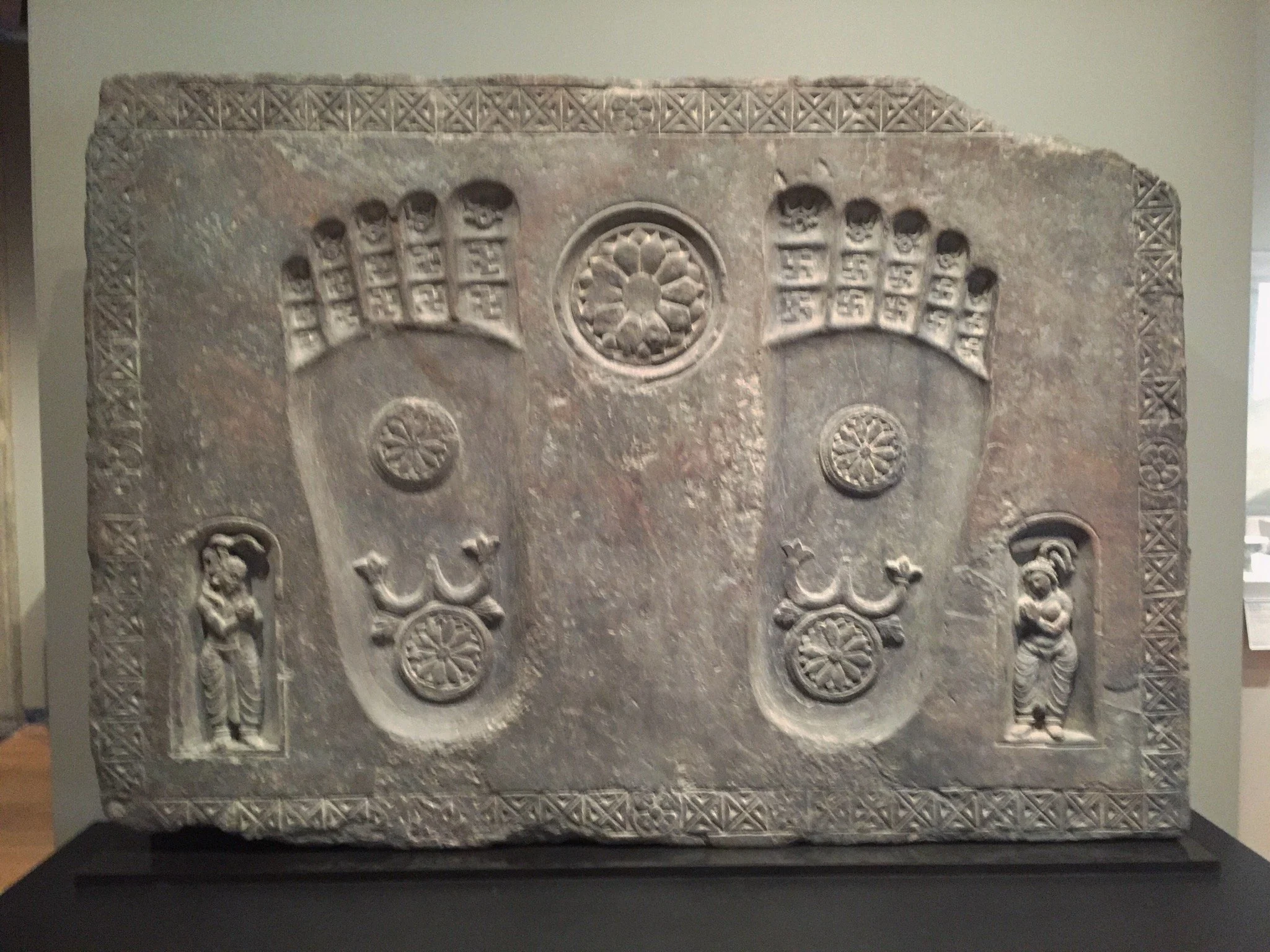You must have lived an intense life to have both been known as “The Harmless One”
( Ahimsaka) and “Finger Necklace” (Aguilmala), but such is the case with today’s Bodhisattva, from the Theravada tradition. How a gentle scholar became a serial killer, then became a compassionate disciple of the Buddha himself is a Redemption story that weaves its sometimes incredulous threads throughout all spiritual paths. In this version, jealous fellow students turned their master against the genius Harmless One, to the point where he tasked him to prove his loyalty by killing a thousand for his master. He did, and liked it, and became brutally adept at killing, earning his new name by adding a finger from each victim to an expanding necklace—a request from the master, whose own psychological makeup would make riveting reading.
Aguilmala hears of the Buddha, is intrigued and, upon seeing him, tries to confront him—out of curiosity? As a final grand prize for his Lovecraftian instructor? In any event, as fast as he ran he couldn’t catch up the calmly walking Buddha, who not only aggravated him by being so elusive, but also by seeming to be unafraid on the by the legendary killer. Finally the Buddha took compassion on him, turned around and said, “I have stopped. It is you who must now stop.” (Angulkinala Sutta)
Mic drop. Tears of remorse. Conversion. A freshy-minted soldier in the Dharma army to relive suffering. The case of Aguilmala reminds me of two friends of mine, with less blood on their hands but with less tidy roads to insight and change.
One is serving life in prison for double homicide; the other was executed about twenty years ago for his involvement in a robbery-turned-fatal. Each wrote to me of their attempts in jail to atone for their crimes and, slowly and not always with vigor, to remember their own worthiness as spiritual beings.
One learned to practice meditation, to chant for his victims; the other poured his time into drawing, and into long letters to me about how the concept of Wabi Sabi helped him face lethal injection as proper atonement. None are easy practices to realize, as it should be, with images of blood and self-hatred filling one’s days. I wouldn’t say either will forgive/forgave themselves of their crimes, but I can attest to the fact that both saw that as irrelevant when compared to the work of memorial and remembrance and grief in a dedicated focus on their victims.
“I have stopped. It is you who must now stop.”
At what point do we stop, or recognize that it might be time to be honest with ourselves about your ideas or behavior?
For most of us we aren’t faced with deeds such as Agulimala or my friends, but harm is harm, no matter the level, with or without police involvement. Lives have crumbled over far less than murder.
For Agulimala it was being in the presence of the compassionate Buddha that triggered his remorse and change of heart.
The shattering moment of realizing the harm one has caused, the magnitude of the work ahead to feel human again, the impotence of the many attenmpts to bring healing, is much messier outside of any Canon. There is a brutality in facing the damage caused by one’s ignorance and impulses; equally brutal is the work to be done to cultivate self-compassion in the midst of self-hatred and ownership of deeply harmful actions.
You can easily say who cares? Murderers self-soothing by practicing compassion for their victims does the dead or the mourning any benefit. Some may also be cold to the idea of “jailhouse conversions” as an all-too-human balm against overwhelming guilt—or perhaps something that looks good on a parole petition.
But have any of us ever really met a Harmless One?
What looks good on our own moral resumes is often self-congratulatory, not a there for the grace of god go I but I would never be capable of xyz.
Of all the stories we tell ourselves, those that elevate us above that which we haven’t experienced are the most tasty, and the most steamy of bullshit. There are those who have experienced, to their horror, of that which they are capable. The only point of any story is to place yourself into it, and explore how you would react. Not enjoyable work, but to truly be awake to what it means to be human involves looking at yourself from all the darker angles, too. Light never needs itself to shine its brightest; the dark serves that purpose.
Like Agulimala, my friends faced their karma viscerally, in a continuous present, surrounded by walls barer than in any Zendo. Remorse and change never heal all wounds, and never deserve a pat on the back. Accepting the consequences of one’s actions, living compassionately and honestly with dirty hands, is basic humanity.
Angulimala: A Murderer's Road to Sainthood (accesstoinsight.org)
